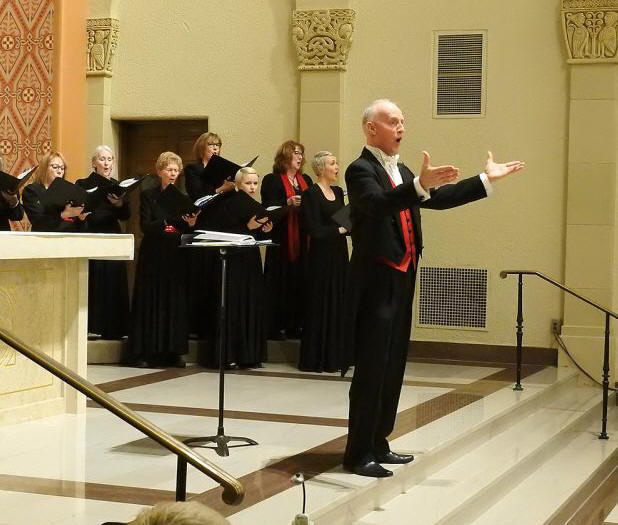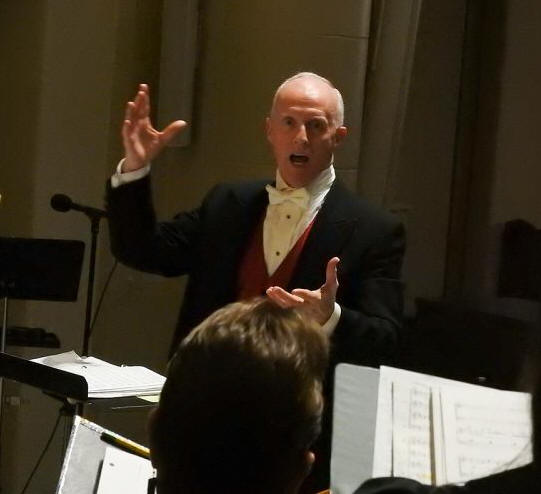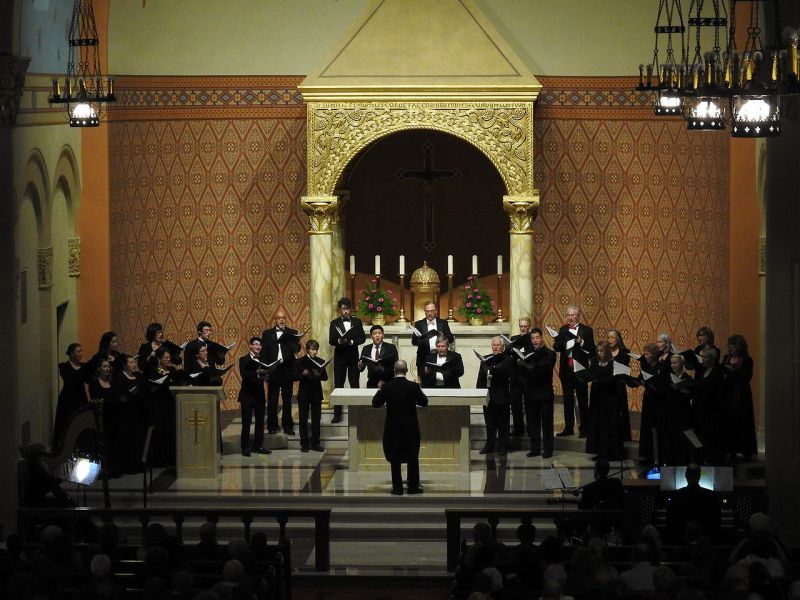Concert Review
Schola Cantorum
From Heaven on High - December 16, 2017
It was a little more than a week until Christmas, and Sacred Heart Church was full of people who were in turn full of anticipation for a Christmas concert that had become an annual tradition for many. The choir entered quietly on both sides of the church and waited while spokesman James McCormick welcomed the audience, noting that this is the 25th anniversary of these “From Heaven on High” concerts. He went on to dedicate this concert to the “peacekeepers in our world” and to Pope Francis on his 81st birthday.
Then McCormick asked us to do something very difficult: to hold our applause until the very end of the concert “even if it means sitting on your hands.” I've seen this request before in concerts directed by Donald Kendrick, and similar, but less complete, prohibitions from other directors — and the logic is clear. A single musical performance is an artistic event, creating a series of emotions. When there's continuity between each piece, they can build on each other, creating a richer experience for the audience. But applause breaks the mood, turning a concert in to a series of discrete performances, and interrupting the flow of emotional gifts presented by the choir.
“Gifts” is a good way to think about this concert, and I felt the spirit of giving behind this carefully crafted event. It began with singers in the left and right aisles of the church with their green light sticks softening the darkness. The women were the first to sing, their sound highlighted by a lovely, soaring a cappella section, and then eventually accompanied by the organ. This was the beginning of a procession to the back of the church and then down the central aisle. But it was a procession in stages. Moving at a solemn pace, the singers paused frequently to sing and then proceeded when the organ solo began. I lost track of how many stages there were in this procession, but along the way I heard more a cappella singing, beautiful close harmonies, a chant by the men… then I stopped analyzing what I was hearing and just took it all in. Throughout, director Donald Kendrick was leading the procession and conducting, but with his back to the singers. The program indicates that he arranged and/or composed the first two pieces that constituted this procession, and it was excellent music and no doubt a spiritual experience for many.
(Click here to open the program in a new window.)
Succeeding pieces led us through changes in mood with singing that was successively light and airy, lyrical, even ethnic. After the first of several Scriptural readings that set the context of the music that was to follow, we had the performance of one of my favorite pieces of the evening, “There Is No Rose” by Robert Young. There was an a cappella start by the men, then the whole choir performed with an impeccable blend. Under Kendrick's direction the tempo and dynamics gave emphasis to the meaning of the lyrics as the voices wove a beautiful musical garment.
|
|
Nearly half the selections in this concert were performed a cappella, wholly or in part. But there were also wonderful contributions from instrumentalists, starting with Sacramento’s premier organist, Ryan Enright, who brought his nuanced playing to every piece he accompanied and amazed me at the beginning of the concert by playing in what appeared to be total darkness.
The music we heard on this evening was frequently made so much richer
by the contributions of Cathie Applle’s flute, Kerstin Allvin’s harp,
and Peter Macina’s guitar. And I noticed that despite the accompaniment
– even by the organ – the acoustics were such that it was the sound of
the choir that really filled the church. Something else I noticed was
the excellent articulation of the choir, which came to my attention
first in the consonant-rich “The Holly and the Ivy.” No lazy mouths in
this ensemble!

After “The Holly and the Ivy” was the first of the two carols for which the audience was invited to join in singing. I say “invited,” but who could refuse Donald Kendrick’s motion for us to stand, and once standing, why not follow through, since everyone around you appeared to be singing? Besides that, there was Kendrick’s overwhelming enthusiasm for the endeavor, which involved a lengthy organ prelude and accompaniment to “Hark! The Herald Angels Sing.”
The audience sing-along was followed by a contemporary setting by Matthew Culloton of the medieval carol, “In Dulci Jubilo.” As I was enjoying the interesting rhythms of this piece, it struck me that this concert was full of artistry: artistry in the program plan, artistry in individual voices and the playing, and artistry in direction. The term, “Artistic Director” took on new meaning for me.
 The
performance of Joey Hoelscher’s arrangement of the 19th century Austrian
carol, “Still, Still, Still” set me on another train of thought. First,
it was unlike any arrangement of this piece that I’ve heard, not just a
song, but a musical gem. The piece included accompaniment by organ,
flute and harp – all good – but there was a dramatic point when the
instruments dropped out and the choir continued. It was a special moment
when I was overwhelmed with appreciation for the singers and the unique
sound of the human voice in multi-part harmony.
The
performance of Joey Hoelscher’s arrangement of the 19th century Austrian
carol, “Still, Still, Still” set me on another train of thought. First,
it was unlike any arrangement of this piece that I’ve heard, not just a
song, but a musical gem. The piece included accompaniment by organ,
flute and harp – all good – but there was a dramatic point when the
instruments dropped out and the choir continued. It was a special moment
when I was overwhelmed with appreciation for the singers and the unique
sound of the human voice in multi-part harmony.
What followed was Tomas Luis de Victoria’s 16th-century setting of “O Magnum Mysterium,” indisputably great music. But as I watched Kendrick conduct, I could see that his understanding of this piece was on a higher level than mine, as he asked his choir – singing a cappella -- for so many refinements in their performance. Similarly, in the piece that followed, “O Come Divine Messiah” by Howard Helvey, there seemed to be a multitude of fresh musical ideas, some very subtle, and Kendrick seemed sensitive to them all. Apparently, the choir did well in following his lead because I thought I caught Kendrick smiling through the whole piece.
In the music that followed there were songs familiar and unfamiliar, lulling and energizing, plus more scriptural reading and another audience sing-along. The concert culminated in a festive piece composed by Kendrick himself, “Noel Sing We,” after which he thanked the audience for attending and thanked Sacred Heart Church for hosting 25 years of these concerts. Since Schola Cantorum is the resident choir at Sacred Heart, he invited the audience to return for the coming Christmas masses to hear the choir again – an appealing invitation because Schola Cantorum is arguably the most accomplished church choir in the Sacramento region.
